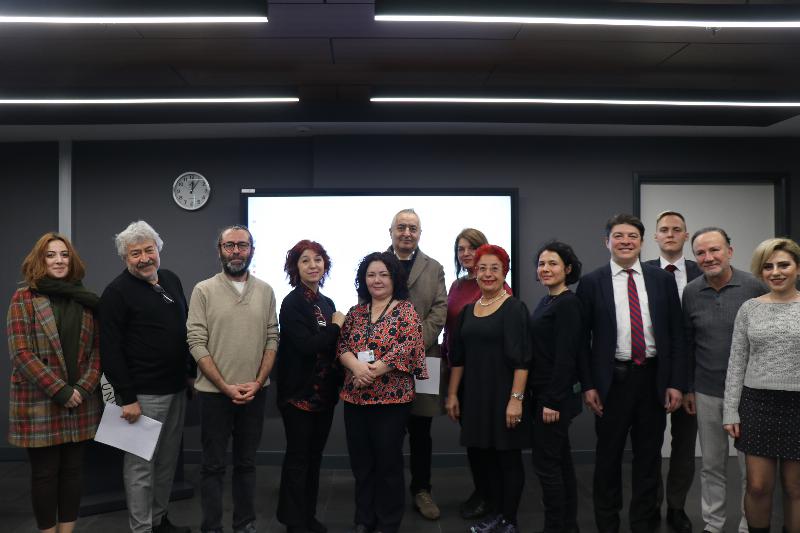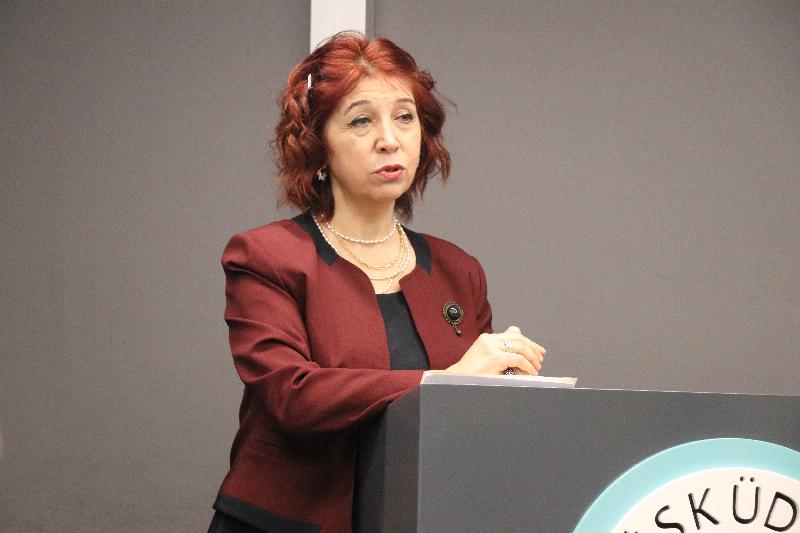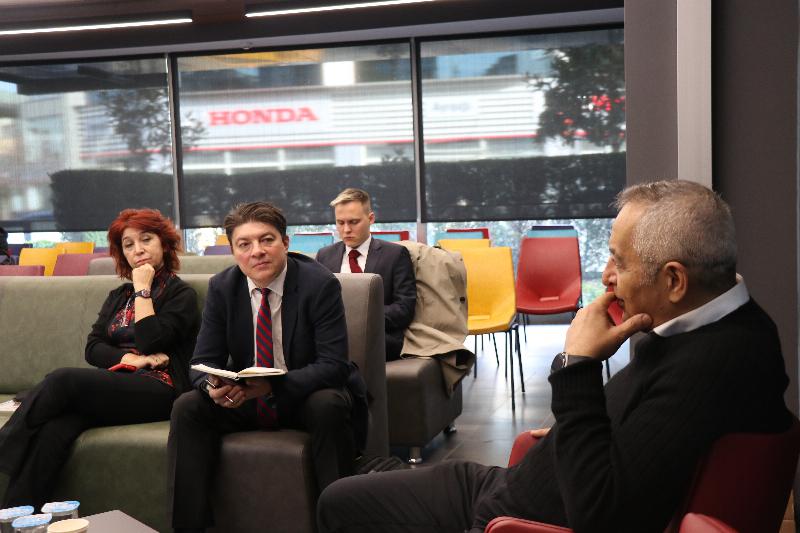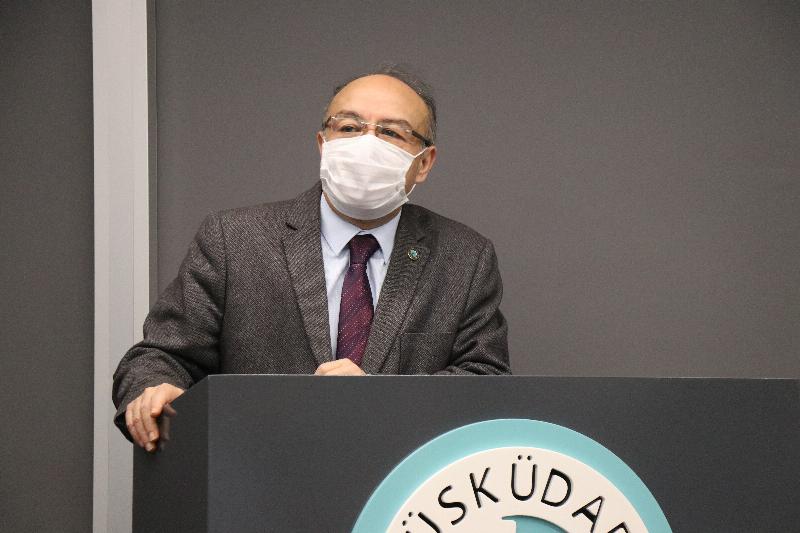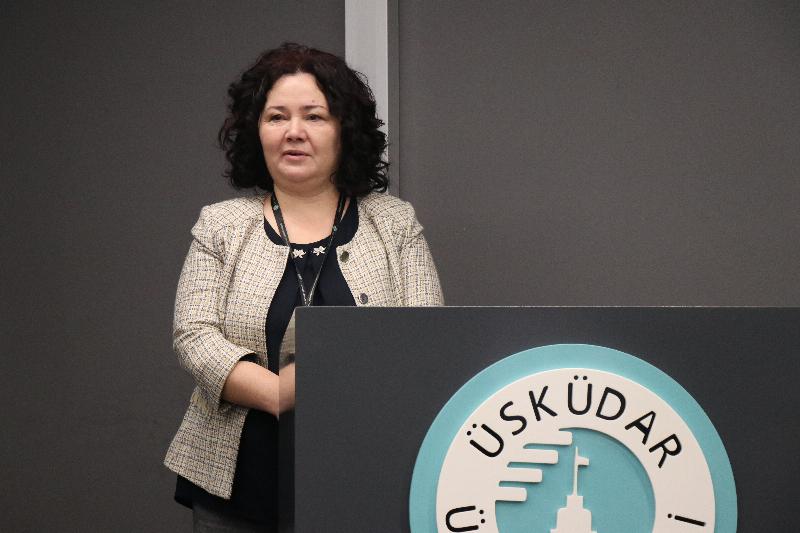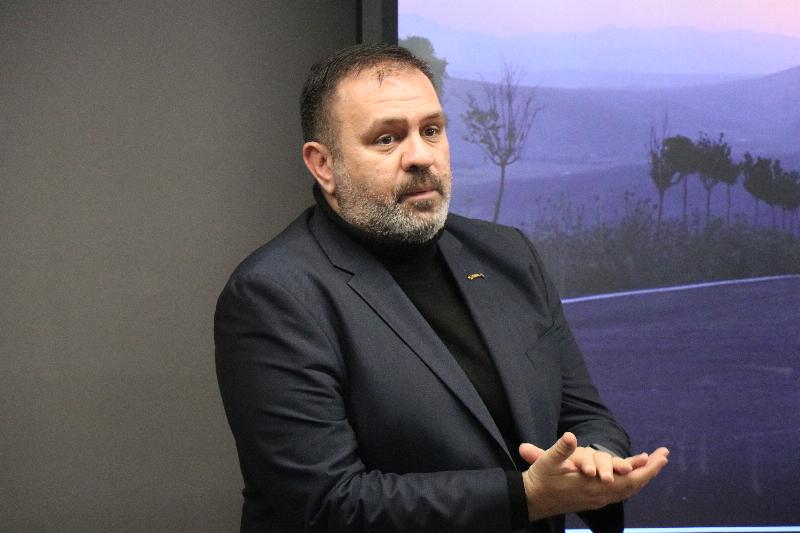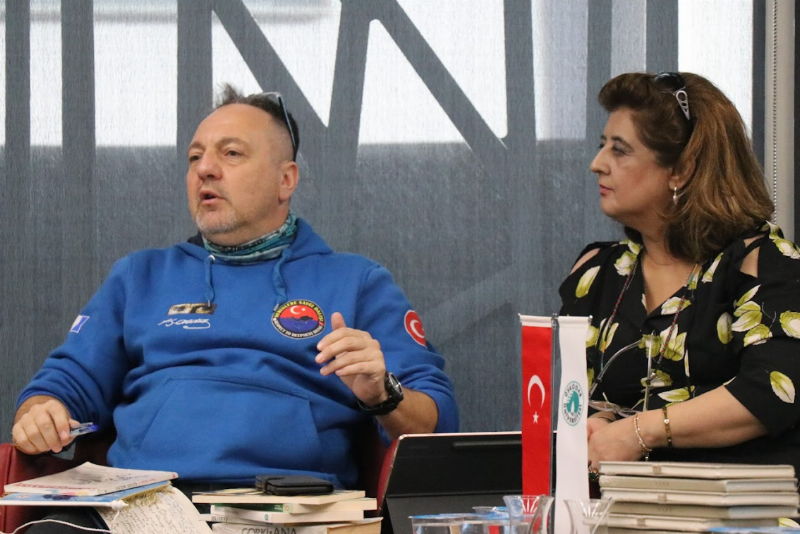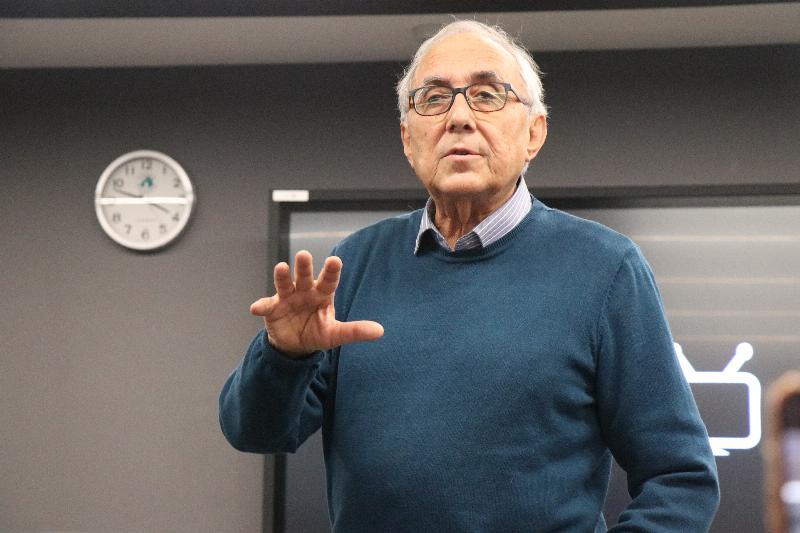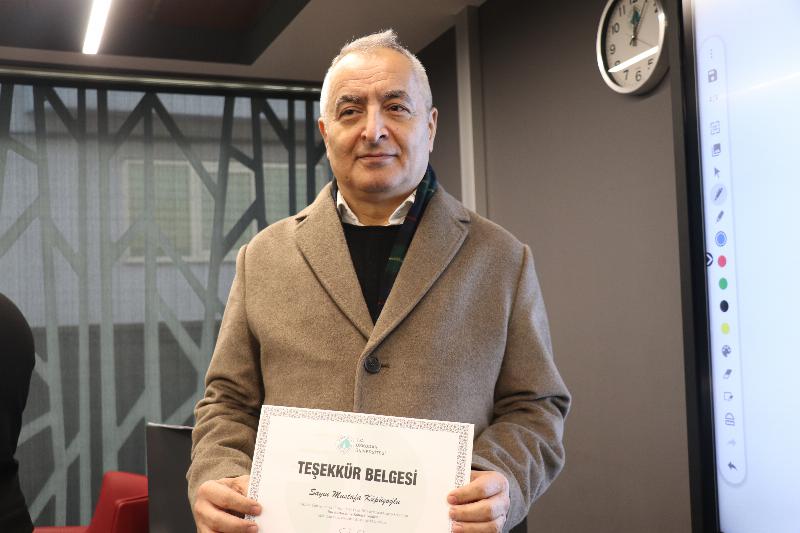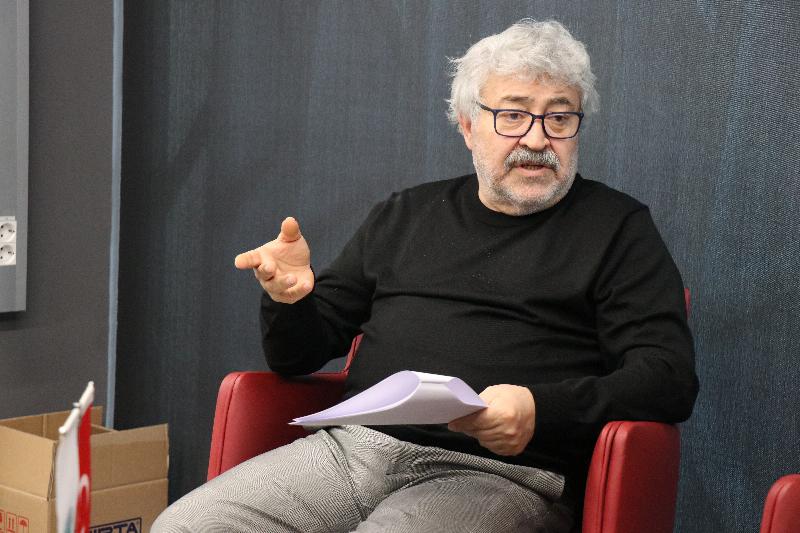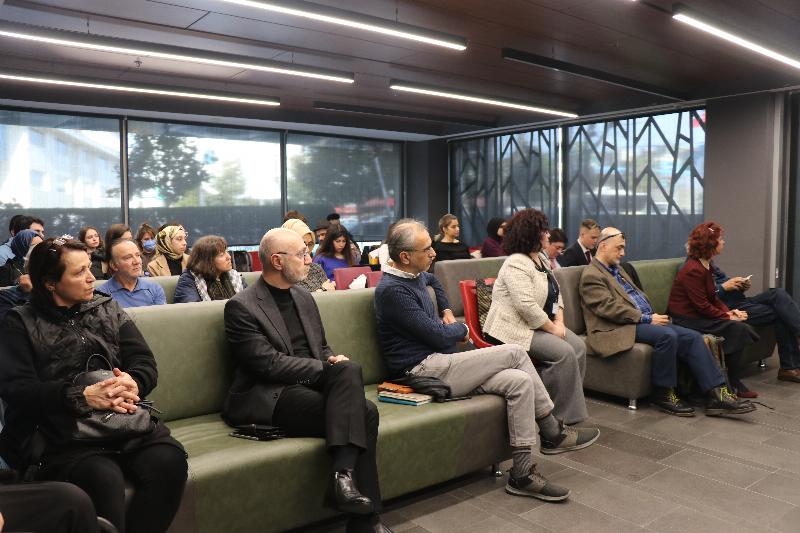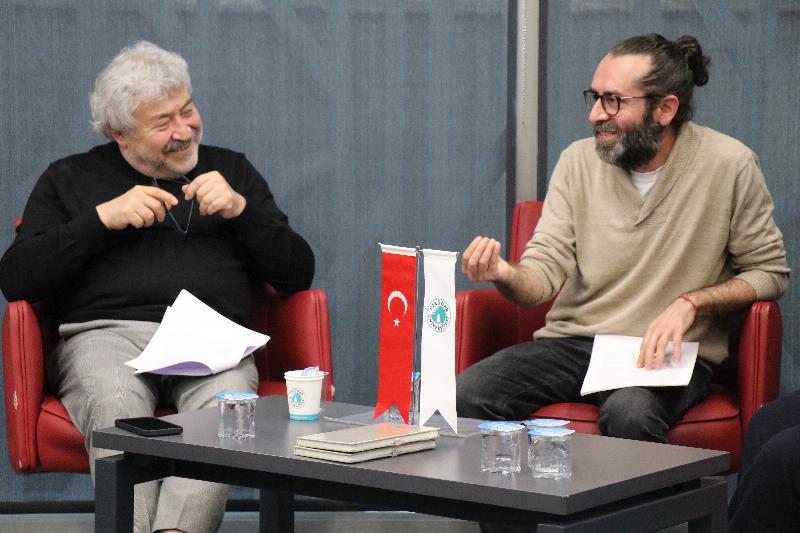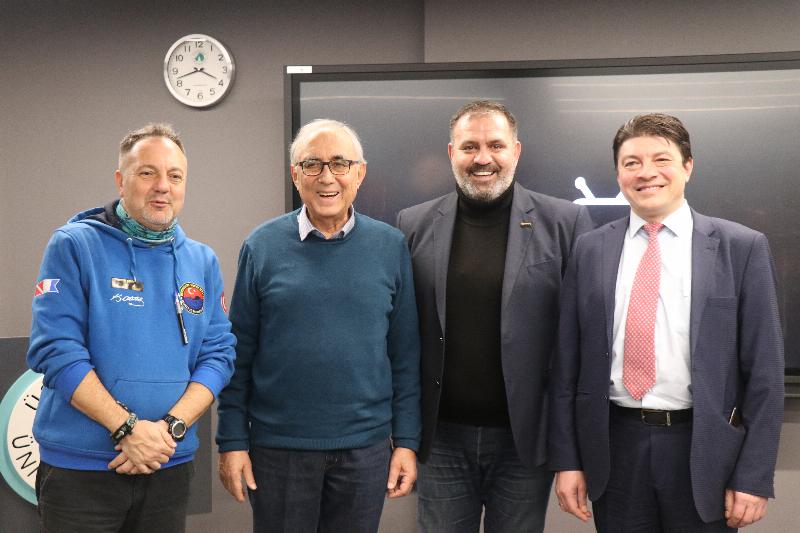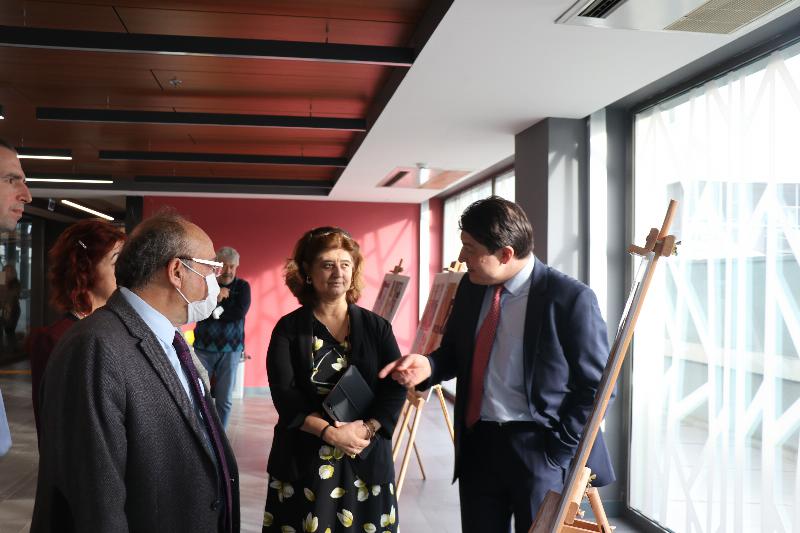‘Russian Literature and Culture Days’ seminar was held in Üsküdar
Russian literature and culture were discussed in many aspects for 2 days at the event held at Üsküdar University. Speakers, including poet, writer Ataol Behramoğlu, Russian House Director Aleksandr Solnichenko, translator Uğur Büke, screenwriter and director Alp Armutlu highlighted the social, cultural and artistic similarities between Russia and Türkiye. While the writer Behramoğlu used the expressions "I found that Russia’s relations with the Turks were wonderful while studying Russian Literature", the Director of the Russian House Assoc. Prof. Aleksandr Sotnichenko also said, “We will solve the Eurasian problems together with Türkiye.”.
Russian House Director Assoc. Prof. Aleksandr Sotnichenko “We will solve the Eurasian problems together”
Participation in the 2-day seminar on "Russian Literature and Culture Days" organized by the Faculty of Humanities and Social Sciences as part of the University Culture course drew great attention.
The seminar was held in the South Campus under the moderation of the Head of the Department of Political Science and International Relations at the Faculty of Humanities and Social Sciences (FHSS), as well as the Director of the PPM (Political Psychology Application and Research Center) Prof. Havva Kök Arslan, FHSS English Translation and Interpreting Department faculty member PPM Deputy Director Assoc. Prof. Feride Zeynep Güder and PPM Deputy Manager Güler Kalay.
On the first day of the seminar, Turkish poet and writer Ataol Behramoğlu, scriptwriter and producer of the book and documentary " Umudun Yolu” (The Path of Hope), Alp Armutlu, and Üsküdar University Faculty of Communication Lecturer and Journalist Gökhan Karakaş participated as a speaker. The opening speech of the seminar was made by Prof. Havva Kök Arslan and Üsküdar University Vice Rector Prof. Muhsin Konuk.
Prof. Havva Kök Arslan: “We lived in peace for 300 years”
Expressing that Russian culture and Turkish culture affect each other, Prof. Havva Kök Arslan said; “We have been thinking about this program for a long time, and we are very excited to have it done today. When we look at the Russian-Turkish relations and culture, it was both a good timing and a time that everyone questioned, however, we are happy that we realized this program. Since I am an International Relations researcher, when we look at the Russian - Turkish history, many wars have been mentioned since 1074, that is, since we lost the Crimea, but in fact, we have not fought that much in about 300 years of history. We actually fought for 11 years. We lived in peace for the remaining 300 years. It is not so many when we look at other countries in European history. After all, when we look at the collapse of the Russian Empire and the Ottoman Empire, it almost coincided. If we consider both the Soviet Union and the Republic of Türkiye as birth, our birth dates were very similar. The assistance of the Soviet Union in the Gallipoli Campaign was very critical. Since we are neighbors, we also influenced each other culturally. Especially Russian Culture has been very influenced by Turkish Culture because they lived very closely with both the Ottoman Empire and the Asian Turkish peoples, they were affected. Today, we have gathered here to talk about how much Russian culture affects Turkish culture.”
Prof. Muhsin Konuk: “Our goal is to open the Center for Russian Studies in Üsküdar”
Expressing that the nations should be united in order for the states to have close relations between them, Prof. Muhsin Konuk said; “There is such a serious relation between Russia and Türkiye that we should forget about the fight and the war in these relations. We believe that the Yunus Emre Institute and the Russian House should jointly build bridges between Civilizations and Cultures and that the rights of the two nations should be more integrated thanks to these bridges. I am honored that this gathering was held especially at Üsküdar University. Our goal is to open the Center for Russian Studies at our university as soon as possible. I believe that this center will also carry out very good works. In relations between states, if there is no cultural relationship, if nations and peoples do not merge with each other, relations between states do not last very long. I hope this meeting will be a concrete step and I thank you all.”.
Dr. Güler Kalay: “Political culture is very important in nation-state relations”
Stating that Russian and Turkish Culture is built on close relations, Kalay said “As the PPM Center, we needed such an event because, as we all know, political culture is very important in the relations between nations and states. The language and socio-cultural structure of societies are extremely important in the formation of political culture. The mutual structure of these cultures in our relationship that started centuries ago as Turkish and Russian societies is very important factors in our state traditions. For this purpose, as the Center for Political Psychology, we wanted to introduce you to our very close neighbor, Russia, with which we are in close political and sociological relations, with its literature and theatre. That's why we organized this event.”.
Dr. Güler Kalay: “Political culture is very important in nation-state relations”
Stating that Russian and Turkish Culture is built on close relations, Kalay said “As the PPM Center, we needed such an event because, as we all know, political culture is very important in the relations between nations and states. The language and socio-cultural structure of societies are extremely important in the formation of political culture. The mutual structure of these cultures in our relationship that started centuries ago as Turkish and Russian societies is very important factors in our state traditions. For this purpose, as the Center for Political Psychology, we wanted to introduce you to our very close neighbor, Russia, with which we are in close political and sociological relations, with its literature and theatre. That's why we organized this event.”.
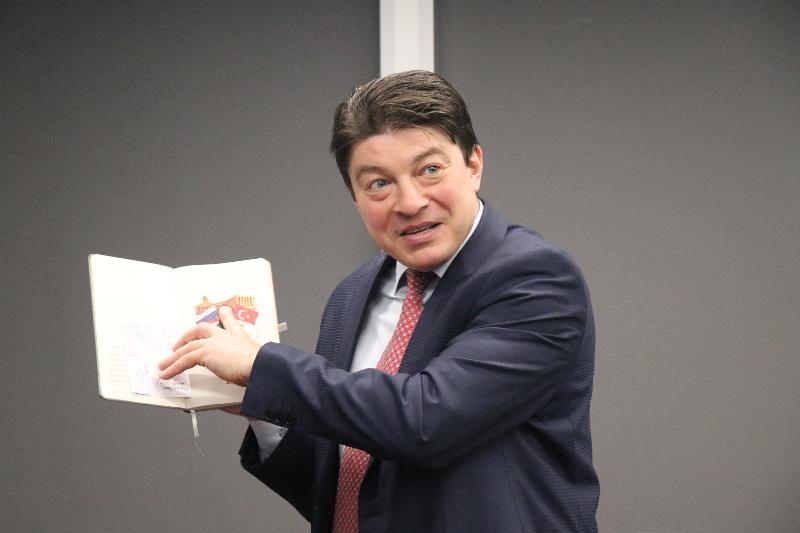
Russian House Director Aleksandr Sotnichenko: “We fought against imperialism together”
Mentioning the projects, they have done for Türkiye - Russia relations as the Russian House, Director of the Russian House Assoc. Prof. Alexander Sotnichenko stated that it is possible to live in an environment of peace and said “We had projects. One of our projects is about Dostoevsky’s books. It was Dostoevsky's 200th birthday in 2021. Together with Ataol Behramoğlu, we organized a ceremony in Eskişehir. We carried out works such as theater and music there. This year, we made a project as it is the 100th anniversary of the Republic of Türkiye. As two independent states, namely Russia and Türkiye, we made a Moscow agreement. This is a fraternity agreement. Together we fought against imperialism. This will be a symbol of cooperation between Russia and Türkiye. We need to know this. Varoshilov was very famous because there were gifts to Mustafa Kemal Atatürk from Varoshilov. This year will be Varoshilov's 90th anniversary. We, as the Russian House, want to hold a big exhibition in Ankara. If we consider Iran, we want to be independent as three independent states. We will solve Eurasian problems together. I hope we will solve the Syrian problem as soon as possible. If the Caucasus, Azerbaijan, Armenia problems or any other problems are there, we can do it together because we live in Eurasia. There is no need for war. Refugees have arrived, and that is not an issue for us. I hope that as Russia-Türkiye, we want to solve the most important problem.”.
Alp Armutlu: “We will broadcast the documentary Umudun Yolu (The Path of Hope) in Moscow”
Alp Armutlu told the birth of the documentary Umudun Yolu (the Path of Hope), which he wrote and directed and said “The Path of Hope Documentary, , tells the contribution of the Anatolian woman to the Turkish War of Independence with their oxcarts between the 344 km roads of İnebolu and Ankara. I took advantage of the pandemic period and wrote the book The Path of Hope. Later, I made a documentary on the Path of Hope with the support of businessmen who read this book. The name and design of the Path of Hope belong to my wife İnci Armutlu. Together with the Director of the Russian House, Aleksandr Sotnichenko, who also appeared as an actor in the documentary, we will probably work on showing it on TV channels or movie theaters in Moscow. Driving 344 km of oxcart is not easy. Do not worry about this because no woman has ever come straight from İnebolu to Ankara. They made it into a 40 or 50 km like a relay race.”.
Journalist Gökhan Karakaş: "Weapons from Soviet Russia helped to win the War of Independence"
Karakaş, who was included in the documentary the Path of Hope, expressed his gratitude to Alp Armutlu and stated that the War of Independence was won under difficult conditions. Karakaş said that: "I was also involved in Alp Armutlu's project. We are both friends who come from the Kuva-yi Milliye culture and are followers of Atatürk's revolutions. I owe a debt of gratitude to him for inviting me. I am happy to be in this project. I would like to underline that everything started with the letter Atatürk wrote to Soviet Russia on April 26, 1920. Without that letter, maybe Alp and I would not have been in your presence. Maybe also not in Türkiye because the weapons from Soviet Russia ensured the victory of the War of Independence. This war was won when the weapons from Soviet Russia were delivered to Anatolia. We have no information on how much weapon aid was given. Unfortunately, there is no academic study on this. Alp taught me that the documentary “the Path of Hope” means “The Path to Independence”. It is necessary to know the 344 km road starting from İnebolu to Polatlı. The naval volume of the occupation forces is 350 thousand tons. The Turkish Kuva-yi Milliye navy is approximately 60 thousand. There is so much difference. We are talking about 8-10 sailboats that challenge an imperialism giant. What a bravery. What a challenge. We challenged it and we won. Young people should be given homework on this subject. They should go to İstiklal Road and camp. You should set up a tent. The fire must be lit. We will do this year with Alp. We will walk through it all. This should be an assignment. It must be a graduation thesis. This issue should be investigated. If it is researched, we will get clearer information about how the War of Independence was won.”.
Ataol Behramoğlu: “While studying Russian Literature, I found that their relations with the Turks were excellent”
Behramoğlu talked about the culture of Russia and Türkiye by giving an interview on Russian literature and said “We need to know the history of the War of Independence by heart. It is not that easy either. We need to memorize. We need to know by heart what happened during this entire period, from May 19, 1919 to April 23, 1920, to the Republic, 100th anniversary of which we are celebrating. If we had lost in Sakarya, neither Türkiye nor Turks would have existed today. Nothing would happen. That's why we need to know this by heart. Our existence lies behind that success in the War of Independence. Russia's help is a big deal. I tried to tell it in my own way in the 'Mustafa Suphi Destanında’ (Epic of Mustafa Suphi). The beginning of Russian literature dates back to the 11th century. The acceptance of Christianity by the Russians at that time and the acceptance of Islam by the Turks took place on roughly the same dates. While I was studying Russian Literature, I always found that their relations with the Turks were excellent. Actually, Russian and Turkish are two languages that are intertwined. So are the subjects. They show the 15th century Ottoman Sultan as an example to the 16th century Russian Prince. How is it that in the 16th century, the 15th century Ottoman Sultan was shown as an example while Russia quickly caught on? 100 years and 200 years have passed in Türkiye. The reason for this is that the first book was printed in Russia in 1564. This is overdue in Türkiye. The Academy of Sciences in Russia was founded in 1725. When we bought the printing press in 1720, the Russians established the academy of sciences in 1725. There is such a thing as a terrible land slavery in Russia from the 11th century to the 19th century. Peasants had no rights or laws. When I was studying Russian literature, I saw these with shock. The answer to the question of why 19th century Russian literature is more populist than French and English literature is the story of slavery. Most of the writers are playing on the farm with those peasant children. Then, when they start to become writers, they begin to understand the injustices. In 1812, Russia is invaded by Napoleon. Russian officers enter as far as Paris. They are fighting shoulder to shoulder with their children. They are fighting with those peasant children and there they know the people better. Therefore, Russian literature is a popular literature.”.
After the closing speech of writer Ataol Behramoğlu, Prof. Havva Kök Arslan presented certificate of appreciation to the speakers. The first session of the Russian Literature and Culture Days ended after a group photo shoot.
In the second session of the seminar on "Russian Literature and Culture Days" organized by Üsküdar University Faculty of Humanities and Social Sciences within the scope of University Culture course, important figures in the field participated again. The second day of the seminar, moderated by Deputy Director of PPM Dr. Güler Kalay, was held with the participation of Alfa Publications Editor-in-Chief Mustafa Küpüşoğlu, Translator Uğur Büke and Theater Director Musa Arslanali as speakers.
Mustafa Küpüşoğlu: “Russia and Türkiye are similar in modernization”
Mustafa Küpüşoğlu mentioned why he showed great interest in Russian works and expressed that “Alfa is a huge publishing house. It prints many books. It's also a mainstream publishing house, of course with a special interest in the classics. It is actually my preference that it pays a great deal of attention to Russian works among the classics. I think the Turkish literature world is very fond of Russian classics because when we say classic, the first country that comes to mind is Russia. I think modernization is very similar for these two countries. Parallel to this modernization in literature, they have a lot in common. Turkish and Russian readers like to read literature on the side of politics. Political tensions in the environment, economic ups and downs push the reader to buy classic books. It is actually a psychological orientation. There is also an interest in Turkish literature in Russia. There was a time when Orhan Pamuk trend blew up.”.
Translator Uğur Büke: “Chekhov is a different personality both in person and in literature”
Uğur Büke, who evaluated the works of Chekhov, said “Chekhov has a different place in Russian Literature because Chekhov is a different personality in person and in literature. His world view is very different. He is unlike any other writer. In general, 99% of the writers that we can now call classics come from the nobility. They write because they had all the free time including Tolstoy. Chekhov's grandfather was a slave. Therefore, apart from these, another literature is born with Chekhov and Dostoevsky. Of course, there is a perspective given by poverty and the effect of the education he received. Chekhov becomes a doctor. However, again, money is not enough and he starts to write short stories. He continues that way. He captures the change in society, especially in the 1880s. He is a writer who can observe the environment very well. The basic reflection of daily life in all of Chekhov's plays… He has 15 big plays. Almost all of them are played all over the world. His scene is very natural and clear.”.
Theater Director Musa Arslanali: “As soon as we get over that small town crisis, Türkiye will go much further”
Musa Arslanali talked about the dramatic structure found in Chekhov's works and said “Chekhov is a classic because he reflects the present. When we read it 300 years later, we find something about today. In theater, we cut certain parts when the text is too long. However, you cannot do this in Chekhov. His works’ language was built in such a strong and dramatic structure that if you miss a word, it is as if the roof will fall apart. The characters are often the same. The small town and the depression there, the negativity of the transition period and the thought of how to move on to something new… We always see modernization in Chekhov. For example, the train metaphor is always present. That train tries to give the idea that one day we will leave this small town. Unfortunately, they cannot. They usually eat each other in that little world over there. A constant love triangle is established in Chekhov's plays. There is always hopeless love. We see examples of theater of the absurd. It is seen in continuity, conversations, stagnant dialogues, constant drinking and despair. There is a constant state of worry in our society. I have always compared the family I grew up with to the world Chekhov founded. I think we have this problem in Türkiye. As Chekhov did, as soon as we get over that small town crisis, Türkiye will go much further.”.
The seminar, which attracted great attention and important figures attended, was carried out by Dr. Güler Kalay anhd Dri Güler Kalay presented the participants with a certificate of appreciation. The seminar ended with a group photo shoot. After the seminar, the Russian Classical Writers Painting Exhibition was visited.
Üsküdar News Agency (ÜNA)
